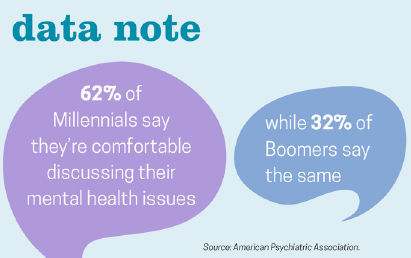therapy talk
Within 10 years, all of the nation’s 74 million baby boomers will be 65 or older. The most senior among them will be on the cusp of 85. Experts say the U.S. isn’t prepared for this vast demographic shift and its far-reaching consequences. Never have so many people lived so long, entering the furthest reaches of old age and becoming at risk of illness, frailty, disability, cognitive decline and the need for personal assistance. The cost of long-term care is unaffordable for most families, there is a growing shortage of in-home health workers, and more than one-third of older adults are obese, with 28% being physically inactive, putting them at higher risk of physical impairments and chronic medical conditions. On a positive note, a worldwide movement to create “age-friendly communities” is taking hold, with some states gearing up to identify and better respond to the needs of older adults. Altering negative attitudes about aging also needs to be a high priority as these efforts proceed.
Source: What The 2020s Have In StoreFor Aging Boomers, Kaiser Health News, January 16, 2020.
Other articles
A Boomer, Pandemics, and Ethics
At the time of this writing, May has begun, and it feels more like Corona-tide than Eastertide as I write this ethics piece. At 64 years of age, I am at the median of those whose births occurred between 1946 and 1964, the post war baby boom. In the middle of a pandemic that appears to kill those over 65 more frequently than others, I worry about toddlers and the elderly alike.
Jeffrey Romer, DMin
It Is All About Relationships
What Family Therapists Should Know and Consider About Their Approach
Kenneth Silvestri, EdD
Academic Writing: MFT Students’ Struggles
Marriage and family therapy (MFT) programs strive to support students develop writing skills to help them write scholarly papers and publish their work. However, this article discusses some challenges minority, international, as well as domestic students face in improving and perfecting their writings and offers some suggestions about better strategies for helping students improve their writing skills.
Afarin Rajaei, MS, Manijeh Daneshpour, PhD and Melissa Welch, MA
